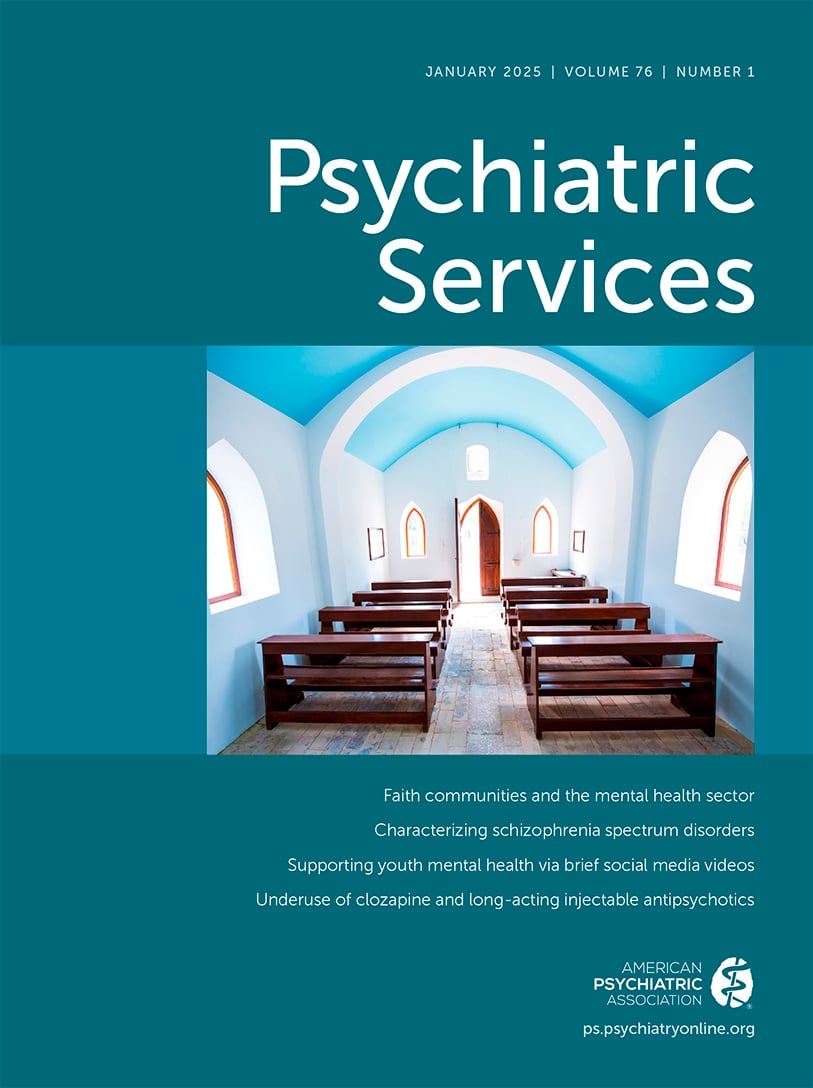Psychiatric Services
- Volume 48
- Number 3
- March 1997
Publication date: 01 March 1997
Pages335–346OBJECTIVE: This review examines the effectiveness of supported employment for people with severe mental illness. METHODS: A comprehensive search was made for quantitative studies, primarily in the published literature. RESULTS: Seven descriptive studies, ...
https://doi.org/10.1176/ps.48.3.335Publication date: 01 March 1997
Pages347–352Consumer empowerment is a political movement that, among many goals, seeks to diminish the stigma and discrimination experienced by people with severe and persistent psychiatric disorders. This paper reviews research strategies that address the ...
https://doi.org/10.1176/ps.48.3.347Publication date: 01 March 1997
Pages353–358OBJECTIVE: This study used laboratory tests to identify current drug and alcohol users among psychotic patients seeking treatment in an urban psychiatric emergency room. Rates of clinician-suspected use and self-reported use were compared, as were ...
https://doi.org/10.1176/ps.48.3.353Publication date: 01 March 1997
Pages359–363In June 1995 the Southeastern Area of the Massachusetts Department of Mental Health became the third health care network, and first mental health care network, to be accredited by the Joint Commission on the Accreditation of Healthcare Organizations (...
https://doi.org/10.1176/ps.48.3.359Publication date: 01 March 1997
Pages364–368Outcomes management has received considerable attention in the literature on mental health services delivery. However, relatively little practical information is available on how to implement an outcomes management system in the mental health care ...
https://doi.org/10.1176/ps.48.3.364Publication date: 01 March 1997
Pages369–373The Access to Community Care and Effective Services and Supports (ACCESS) demonstration program was initiated in 1993 by the U.S. Department of Health and Human Services as part of a national agenda to end homelessness among persons with serious mental ...
https://doi.org/10.1176/ps.48.3.369Publication date: 01 March 1997
Pages374–380OBJECTIVE: Networks of agencies at the 18 demonstration sites in the Access to Community Care and Effective Services and Supports (ACCESS) program for homeless persons with serious mental illness were surveyed to profile baseline levels of systems ...
https://doi.org/10.1176/ps.48.3.374Publication date: 01 March 1997
Pages381–386OBJECTIVE: Clients' and providers' perceptions of clients' needs were compared in 18 community treatment programs participating in the Access to Community Care and Effective Services and Supports program of the Center for Mental Health Services, a ...
https://doi.org/10.1176/ps.48.3.381Publication date: 01 March 1997
Pages387–390Clients entering the Access to Community Care and Effective Services and Supports (ACCESS) program for homeless mentally ill persons in 18 U.S. communities identified barriers to service use. The most frequent barrier was not knowing where to go for a ...
https://doi.org/10.1176/ps.48.3.387Publication date: 01 March 1997
Pages390–392This study examined the rate of admission to public shelters between 1990 and 1992 among persons who received Medicaid-reimbursed inpatient and outpatient psychiatric services and inpatient substance abuse services in Philadelphia between 1985 and 1993. ...
https://doi.org/10.1176/ps.48.3.390Publication date: 01 March 1997
Pages393–395Discharge diagnoses of 31 female veterans and 31 male veterans hospitalized at a large urban VA medical center were examined to elucidate possible biases in clinicians' diagnostic practices. Only one woman in the sample was diagnosed as having ...
https://doi.org/10.1176/ps.48.3.393Publication date: 01 March 1997
Pages395–397A survey of the use of seclusion and restraint during 1994 was conducted at 124 state psychiatric hospitals to update data from a survey of 108 such hospitals conducted for 1991. Rates of patients' placement in seclusion and restraint, hours spent in ...
https://doi.org/10.1176/ps.48.3.395Publication date: 01 March 1997
Pages398–399To determine state psychiatric hospitals' responses to sexual behavior among inpatients, the authors sent a questionnaire to the directors of 86 state facilities. Eighty-eight percent of the 57 respondents considered sexual behavior to be a clinical ...
https://doi.org/10.1176/ps.48.3.398Article
Article
Article
Past Issues
View Issues Archive
Vol. 76 | No. 1

Vol. 75 | No. 12

Vol. 75 | No. 11
